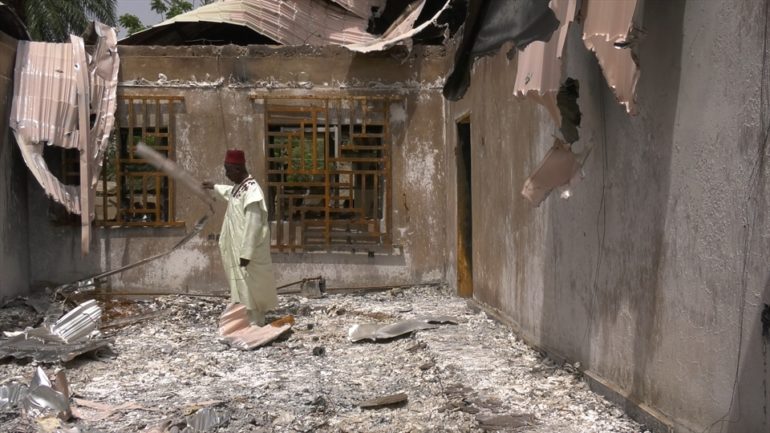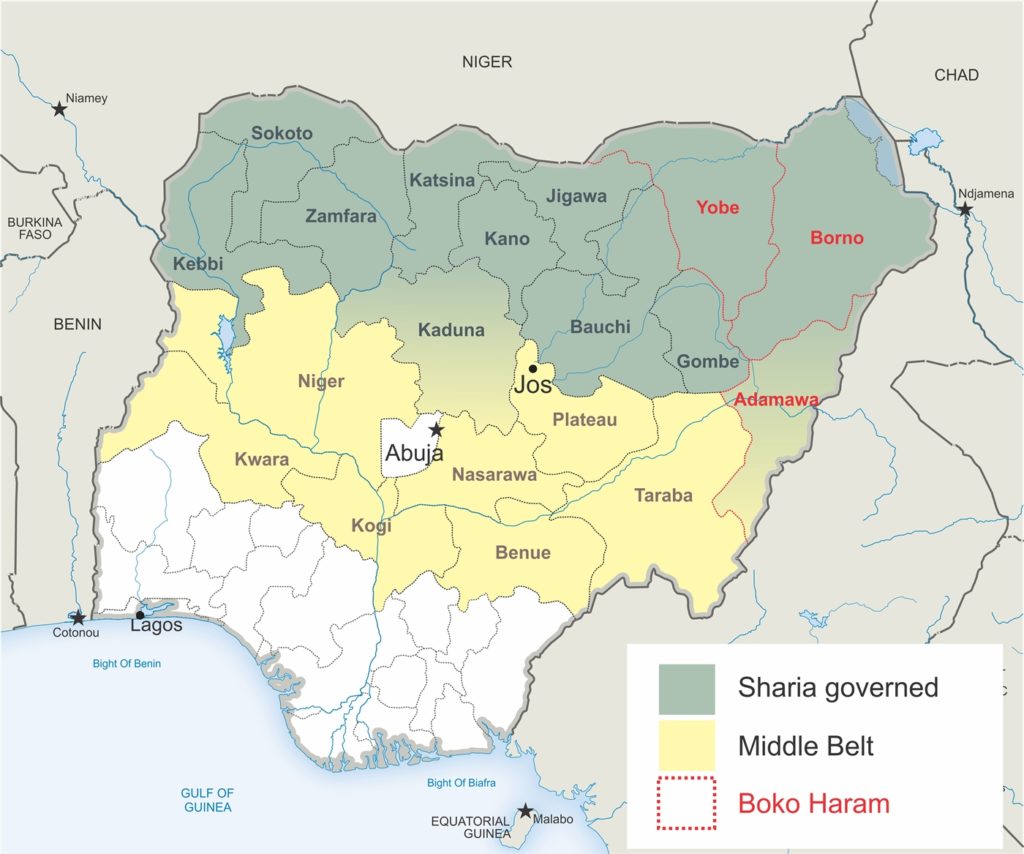In northern Nigeria, targeted violence against Christians comes not only from the Islamic militants of Boko Haram. Clashes with militants among the predominantly Muslim Fulani herdsmen have claimed thousands of Christian lives in Nigeria’s Middle Belt – the handful of states straddling the pre-colonial line dividing Nigeria’s predominantly Muslim north from its Christian south.

1. The Fulani are predominantly Muslim cattle herders
Thirty-eight million people belong to the larger Fulani cluster of ethnic groups found in pockets across 19 Central and West African countries. They speak a variety of languages, including Hausa, English, French and Arabic, and form the world’s largest nomadic group roaming this large area in search of grazing for their cattle. Although there are varying degrees of dedication throughout Fulani society, 99% follow Islam.
2. They are in conflict with farmers in northern Nigeria’s strategic Middle Belt
The Middle Belt is part of Muslim-dominated northern Nigeria. Unlike the Hausa Muslim-dominated far northern states, the Middle Belt hosts a diversity of peoples and cultures. It is a melting pot of ethno-religious groups that have long co-existed. It is also the centre of the Christian presence in the north. Many regard this area as the breadbasket of northern Nigeria. As the Fulani herders increasingly migrate southward, they have come into conflict with the mostly Christian grain farmers over resources.

3. Socio-economic factors drive conflict, but also religious undertone
Increasing desertification drives the Fulani gradually southward, intensifying pressure on already scarce resources. Herders have migrated here looking for pasture and water, in a virtually unchecked way, from neighbouring West African countries (especially Niger) which suffer drought. A report from global charity and religious watchdog Open Doors points out that “along with the herdsmen, there has been mass migration towards the south, putting pressure on access to land, jobs and government funds”.
Although socio-economic factors have sparked conflict in the region, clashes also seem to have taken on a religious dimension. The Nigeria Conflict Security Analysis Network, in its research, argues that this is not just an advanced form of jostling over territory. Rather, it says, it is part of a political strategy that is inspired by the Islamic doctrine of Dar al–Islam, which translates as “the house of Islam” and describes the obligation to bring the non-Islamic under the rule of Islam.
It is an ideology that pitches the migrant Hausa-Fulani herdsmen from the north against the indigenous Christian population of the Middle Belt region. The migrants, the authors say, are determined not only to keep their own traditions and culture, but also to make them dominant: the battlegrounds are religious, political, economic and social.
The stories coming out of the region tell a consistent tale of harassment, discrimination and outright persecution. In Taraba State, for example, Hausa-Fulani attacks on Christian communities have caused mass internal displacement. Thousands of indigenous farmers have scrambled to the state capital of Jalingo for safety.
Research in three states showed that 88 per cent of victims in Benue State were Christians, 70 per cent in Taraba State, and 75 per cent in Nasarawa State, where “Christians are being driven out of their ancestral homes, and those who refused and stayed were indiscriminately targeted. The vacated lands are being grabbed by those responsible for the displacement”.
The history of the Fulani people knows of waves of radicalisation combining the conquering of land with expansion of religion. They played a role in the jihad of Usman dan Fodio (1804-1815), who conquered parts of the Middle Belt and incorporated them into the Sokoto caliphate that lasted until 1903.
In recent decades, the Fulani have again grown increasingly radical due to the influx of radical Islamic preaching by missionaries from Saudi Arabia and Iran. Attacks can be seen as a continuation of jihad, seeking an Islamic state throughout Nigeria.
The Catholic Bishops of Kaduna, an area that suffered many attacks in recent years, recently said, “The Fulani want to subjugate Christians, disintegrate the country, weaken the Gospel and destroy the social and economic life of the people. There is a hidden agenda targeted at the Christian majority of southern Kaduna. This jihad is well-funded, well-planned and executed by agents of destabilisation”.
4. Attacks have been brutal and are ongoing
The US Department of Defence’s Africa Centre for Strategic Studies estimated that, by January this year, more than 60,000 people had died since 2001 in pastoralist-related violence in Nigeria alone. Thousands more have been injured in the attacks and hundreds of women have been kidnapped. Fulanis have destroyed countless homes and churches and seized large swathes of land and property.
Open Doors’ research further shows that violence increased in the run-up to the 2015 presidential elections and persisted since Muhammadu Buhari, himself a Fulani, became president. It estimates that the group killed as many as 6,500 people in Kaduna, Plateau, Nasarawa, Benue and Taraba states between 2013 and 2015 alone. The Local Government Areas of Jama’a, Kachia, Kagarko, Kaura and Sanga in southern Kaduna have been the worst hit. World Watch Monitor’s sources indicate that more than 50 villages have been attacked in the last 12 months alone.
5. Government criticised for ‘inaction’
The National Christian Elders Forum expressed in March 2016 its dismay at “the inaction of the Federal Government to the carnage and destruction caused by the Fulani herdsmen against legitimate native land owners and farmers across the country… For years, the Fulani herdsmen have been murdering innocent Nigerians with impunity… The response of the government to the menace of the Fulani herdsmen has to date been tepid and indifferent”.
“The crisis here has persisted because of the way and manner the Federal and State governments, as well as the Security Agents, are handling it,” said Bishop Joseph Bagobiri of Kafanchan, southern Kaduna, in March this year. “Many of us are disappointed to see that our political leaders are taking sides and known to be supporting, directly or indirectly, the Fulani themselves and that is why they are fast losing the support and trust of the people.”
According to the Catholic Bishops of Kaduna, “The government has shown outright partisanship in favour of the herdsmen, to the disappointment of the majority of southern Kaduna indigenes and Christians… In most of these attacks, the military stands aloof and watches while our people are being massacred… In the Godogodo and Pasakori attacks, for example, the military merely watched and supervised the burning of our homes. When the youth mobilised to repel the attackers, the soldiers deliberately blocked them from entering the town.”
“The intervention of the Nigerian government has been slow and haphazard. No attempt has been made to address key issues. No herdsmen were held accountable for the atrocities already committed; there was no discussion of prosecution for perpetrators, nor of compensation, nor provision of security for victims. Many communities were left displaced and fearful, without any security,” writes Yonas Dembele in a 2016 report for the World Watch Research unit of Open Doors.
He continues, “The administration of President Buhari has been very slow to recognise the severity of the problem and come up with a plan to address it. While [he] made it a priority for the Nigerian armed forces to defeat Boko Haram in northern Nigeria and demanded that this be accomplished in a relatively short period of time, he has paid little attention in comparison to the situation in the Middle Belt.
“A government cannot solve a problem that it has not recognised and is not paying attention to. The neglect of the situation has meant that the attacks by the Fulani militia are becoming more deadly and sophisticated… There seems to be little intelligence and information gathered by the government to understand the source of the problem and how it has evolved and if there is more to the conflict than meets the eye. More importantly, the persistent failure of the government to secure its borders, to control the flow of weapons, and its failure to provide protection to the communities that are being systematically wiped out, is a colossal failure that is having very tragic consequences. There also seems to be a lack of urgency in the government’s response to the situation.”
